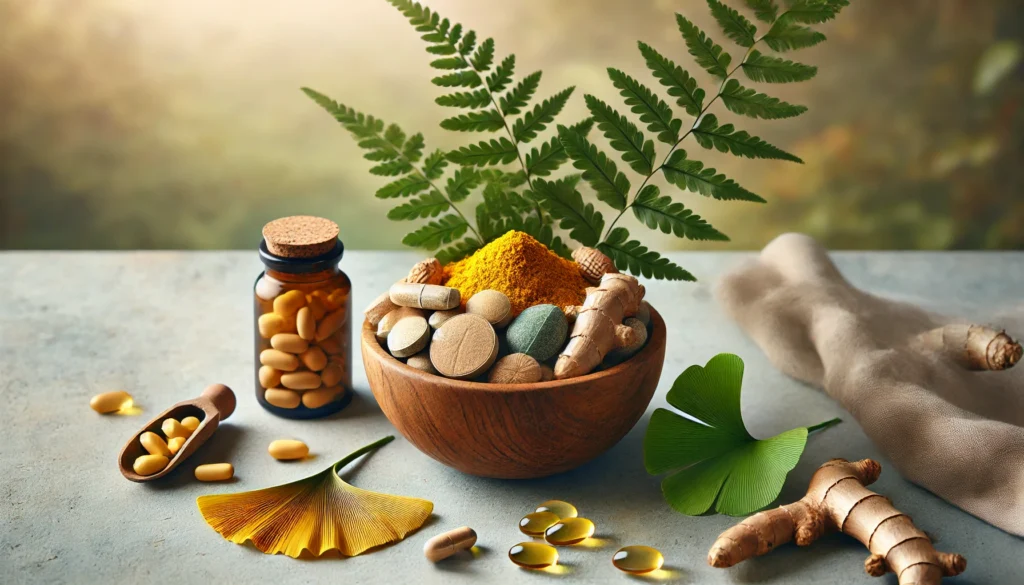Introduction
In an age where mental agility, focus, and memory retention are more crucial than ever, interest in cognitive enhancement has surged. Natural brain stimulants have gained significant attention due to their potential to support brain function without the side effects associated with synthetic drugs. Researchers have explored various natural focus enhancers to understand their impact on cognitive function, and the findings suggest that certain compounds may improve concentration, memory, and overall mental clarity. This article delves into the scientific mechanisms behind natural nootropic supplements, exploring their efficacy, potential risks, and role in enhancing mental performance. It also addresses the ethics of cognitive enhancement and the limitations of over-the-counter pills for concentration.
You May Also Like: Are Vitamins a Source of Energy? Understanding Their Role in Metabolism and Vitality
Understanding Cognitive Function and Neurotransmitters
Cognitive function encompasses several mental abilities, including perception, memory, attention, reasoning, and problem-solving. These processes are governed by neurotransmitters—chemical messengers that facilitate communication between neurons. The most critical neurotransmitters involved in cognition include acetylcholine, dopamine, serotonin, and glutamate. Acetylcholine is associated with memory and learning, while dopamine plays a role in motivation and pleasure. Serotonin influences mood and emotional regulation, and glutamate is vital for synaptic plasticity, which underpins learning and memory.
Natural focus enhancers often work by modulating these neurotransmitters, either by increasing their production, inhibiting their breakdown, or enhancing receptor sensitivity. This modulation can result in improved cognitive performance, sustained attention, and better problem-solving abilities. However, not all natural supplements work through the same mechanisms, and their effects can vary based on individual brain chemistry.
The Role of Nootropic Supplements in Enhancing Cognitive Function
Nootropic supplements, often referred to as “smart drugs,” are substances believed to improve cognitive abilities without causing significant side effects. The term “nootropic” was coined by Corneliu Giurgea, a Romanian psychologist and chemist, in the 1970s. He defined nootropics as substances that enhance learning and memory, protect the brain from damage, and support cognitive function under stress.
Many nootropic supplements contain plant-derived compounds such as Bacopa monnieri, Ginkgo biloba, and Rhodiola rosea. These natural pills have been studied extensively for their potential to enhance memory retention and focus. Bacopa monnieri, for instance, has been shown to improve recall and reduce the time required for learning new information. Ginkgo biloba increases cerebral blood flow, which can lead to improved concentration and mental clarity. Rhodiola rosea helps mitigate stress-induced cognitive decline, making it a valuable option for individuals facing high-pressure environments.

Over-the-Counter Medicine to Help You Focus: Are They Effective?
Many individuals seek over-the-counter pills for concentration, hoping to find a quick and accessible solution for enhancing productivity. Unlike prescription stimulants such as Adderall and Ritalin, over-the-counter options often contain a blend of herbal extracts, amino acids, and vitamins that support cognitive function. Ingredients such as caffeine, L-theanine, and phosphatidylserine are commonly found in these formulations.
Caffeine, a well-known stimulant, increases alertness and reduces fatigue by blocking adenosine receptors in the brain. When combined with L-theanine, an amino acid found in green tea, caffeine’s stimulating effects become more balanced, reducing jitteriness while promoting a state of relaxed focus. Phosphatidylserine, a phospholipid present in cell membranes, plays a crucial role in maintaining brain structure and function. Studies suggest that supplementation with phosphatidylserine can enhance memory, particularly in aging individuals.
While over-the-counter medicine to help you focus can provide temporary cognitive boosts, their efficacy varies depending on the formulation and individual response. Additionally, the long-term safety of some ingredients remains under investigation, highlighting the need for responsible usage.
Natural Brain Stimulants and Their Impact on Neuroplasticity
Neuroplasticity refers to the brain’s ability to reorganize itself by forming new neural connections in response to learning and experience. This process is fundamental for memory formation, problem-solving, and adaptation to new challenges. Several natural brain stimulants have been shown to enhance neuroplasticity by promoting the growth of dendrites and synapses.
Lion’s mane mushroom (Hericium erinaceus) is one such compound that has garnered attention for its neuroprotective properties. Research suggests that lion’s mane stimulates nerve growth factor (NGF), a protein essential for the survival and growth of neurons. By enhancing NGF production, lion’s mane may support cognitive function and slow age-related cognitive decline. Another potent natural brain stimulant is omega-3 fatty acids, found in fish oil and flaxseeds. Omega-3s contribute to neuronal membrane fluidity, improving cell communication and reducing inflammation that can impair cognitive function.
Ethical Considerations and the Use of Natural Pills to Influence Thinking
The concept of using natural pills you can use to control a person’s thinking raises significant ethical concerns. While cognitive enhancement can be beneficial in educational and professional settings, the potential for misuse and coercion must be addressed. Some individuals may use these supplements to manipulate others, raising questions about autonomy and informed consent.
From a neuroscientific perspective, cognitive enhancement should prioritize individual well-being rather than coercion or control. Ethical nootropic use involves transparency, voluntary participation, and a commitment to optimizing brain health rather than altering another person’s thoughts against their will. Additionally, while natural supplements can support cognitive function, they do not override personal beliefs, values, or decision-making capacity.
The Future of Cognitive Enhancement and Natural Supplements
The field of cognitive enhancement continues to evolve as researchers uncover new natural compounds with potential benefits for mental performance. Advances in neuroscience and pharmacology are expected to lead to the development of more targeted nootropic supplements that optimize brain function with minimal side effects.
Personalized nootropics, tailored to an individual’s genetic makeup and cognitive profile, may become more prevalent in the coming years. This approach would ensure that natural focus enhancers are more effective and aligned with individual neurochemical needs. Furthermore, as scientific understanding of brain health deepens, future research will likely explore novel plant-based compounds that support long-term cognitive resilience.

Frequently Asked Questions (FAQ) on Natural Pills and Cognitive Enhancement
1. How do natural pills influence cognitive function compared to synthetic nootropics?
Natural brain stimulants differ from synthetic nootropics in their mechanisms and safety profiles. Synthetic options, such as prescription stimulants, provide immediate and often intense cognitive boosts by increasing dopamine or norepinephrine levels. However, natural focus enhancers work more gradually, supporting neuroplasticity, reducing oxidative stress, and enhancing neurotransmitter balance over time. For example, Bacopa monnieri improves memory retention by modulating acetylcholine levels, while Rhodiola rosea combats cognitive fatigue by regulating stress hormones. Unlike synthetic drugs, natural pills offer long-term cognitive benefits with fewer side effects, making them a sustainable option for enhancing mental performance.
2. Can over-the-counter medicine for focus be as effective as prescription stimulants?
While over-the-counter pills for concentration can support cognitive function, their efficacy varies depending on the formulation and individual response. Prescription stimulants directly influence dopamine pathways, leading to rapid improvements in focus and energy. In contrast, over-the-counter focus enhancers rely on ingredients like L-theanine, which promotes calm alertness, or Panax ginseng, known for improving mental clarity. Though these natural options may not provide the immediate intensity of prescription drugs, they contribute to sustained cognitive health by reducing inflammation, improving blood flow, and supporting brain cell communication. Over-the-counter medicine to help you focus may be a preferable alternative for those seeking gradual, long-term benefits without dependency risks.
3. Are natural pills you can use to control a person’s thinking scientifically valid?
The idea of using natural pills you can use to control a person’s thinking is largely a misconception. While certain natural compounds can influence neurotransmitters and cognitive function, they do not grant external control over an individual’s thoughts or decision-making. Compounds such as adaptogens (e.g., ashwagandha) can reduce anxiety, while choline sources (e.g., alpha-GPC) support logical reasoning and memory retention. However, these effects are subtle and dependent on individual neurochemistry, lifestyle factors, and dosage. Ethical concerns also arise when cognitive enhancement is used coercively, emphasizing the importance of voluntary and informed use of cognitive-enhancing supplements.
4. What are the most scientifically backed natural brain stimulants?
Several natural brain stimulants have substantial scientific backing for their cognitive benefits. Lion’s mane mushroom, for instance, is known for stimulating nerve growth factor (NGF), which supports neurogenesis and long-term brain health. Ginkgo biloba improves cerebral blood flow, enhancing memory and reaction time. Omega-3 fatty acids, found in fish oil, contribute to synaptic function and reduce neuroinflammation, which is crucial for cognitive longevity. Each of these natural stimulants enhances different aspects of cognitive function, and combining them strategically may yield synergistic effects. Continuous research into natural brain stimulants suggests their role in neuroprotection and cognitive resilience, especially in aging populations.
5. What role do nootropic supplements play in stress management and cognitive performance?
Nootropic supplements are not only beneficial for focus and memory but also for stress resilience. Many nootropics, such as Rhodiola rosea and L-theanine, regulate cortisol levels and reduce the negative impact of stress on cognitive performance. Adaptogens like ashwagandha help stabilize mood and improve reaction times under pressure. By mitigating stress-related cognitive decline, these natural focus enhancers enhance problem-solving skills, decision-making, and sustained mental clarity. Research suggests that long-term use of adaptogenic nootropics can promote emotional stability while preserving neural efficiency in high-stress environments.
6. Are over-the-counter pills for concentration safe for daily use?
The safety of over-the-counter pills for concentration depends on the ingredients, dosage, and individual health conditions. Many natural focus enhancers, such as L-theanine and phosphatidylserine, have been studied extensively and are considered safe for long-term use. However, some stimulant-based formulations containing high doses of caffeine or synthetic compounds may cause dependency or disrupt sleep patterns. It is crucial to assess the cumulative effects of these supplements, especially when combining multiple cognitive enhancers. Consulting a healthcare professional before incorporating daily nootropic supplements can help determine the safest and most effective approach for cognitive support.
7. What are the best focus drugs available without a prescription?
The best focus drugs that do not require a prescription include natural and synthetic options. Caffeine and L-theanine combinations are widely used for their ability to enhance alertness without causing jitteriness. Citicoline, a precursor to acetylcholine, is known to improve memory and cognitive flexibility. Rhodiola rosea and Panax ginseng are often used in herbal formulations to combat mental fatigue. While these over-the-counter medicine to help you focus may not be as potent as pharmaceutical stimulants, they offer sustainable cognitive benefits without significant side effects. The effectiveness of these substances depends on consistency of use and lifestyle factors, such as diet and sleep quality.
8. How do natural focus enhancers compare to traditional cognitive training methods?
Natural focus enhancers complement cognitive training methods but should not replace them. Cognitive training, such as memory exercises, meditation, and problem-solving tasks, strengthens neural pathways over time. When combined with nootropic supplements, the benefits of training can be amplified, as certain compounds facilitate neuroplasticity. For example, phosphatidylserine supplementation has been linked to improved learning retention, making it a valuable addition to structured cognitive training programs. The most effective approach to cognitive enhancement integrates both biochemical support from natural focus enhancers and behavioral strategies to optimize brain function.
9. Can nootropic supplements be used to support age-related cognitive decline?
Nootropic supplements are increasingly researched for their role in slowing cognitive decline associated with aging. Ingredients such as resveratrol, curcumin, and omega-3 fatty acids provide neuroprotective benefits by reducing oxidative stress and inflammation. Additionally, compounds like acetyl-L-carnitine support mitochondrial function, which is critical for energy production in aging brain cells. While no single supplement can entirely prevent neurodegeneration, a well-formulated regimen of nootropic supplements may contribute to maintaining cognitive resilience well into older age. Research continues to explore the potential for natural interventions in delaying conditions such as dementia and Alzheimer’s disease.
10. What are the limitations of using natural brain stimulants for cognitive enhancement?
Despite their potential, natural brain stimulants have limitations. Their effects tend to be more subtle and gradual compared to pharmaceutical alternatives, requiring consistent use for noticeable benefits. Additionally, their efficacy varies widely among individuals due to genetic differences, diet, and lifestyle factors. Unlike synthetic stimulants, natural compounds do not induce immediate, dramatic cognitive changes, which may disappoint users seeking quick fixes. Another limitation is the variability in supplement quality, as unregulated products may contain inconsistent dosages. To maximize benefits, it is advisable to select high-quality, research-backed supplements and combine them with other cognitive-supportive practices, such as exercise and mindfulness.

Conclusion
Natural nootropic supplements hold great promise for enhancing cognitive function, improving focus, and supporting brain health. While many over-the-counter pills for concentration provide temporary benefits, their long-term effects require further study. Ethical considerations surrounding cognitive enhancement highlight the importance of responsible use and informed decision-making. As research progresses, the potential for personalized nootropic solutions may revolutionize cognitive enhancement, offering safe and effective ways to support mental performance. Understanding the science behind natural brain stimulants allows individuals to make informed choices about their cognitive health, ensuring a balanced and sustainable approach to mental well-being.
brain-boosting supplements, cognitive enhancement pills, memory support supplements, herbal brain boosters, mind clarity enhancers, focus-boosting herbs, smart drug alternatives, brain health optimization, natural mental performance aids, attention and concentration boosters, cognitive function support, neuroprotective herbs, stress-reducing nootropics, herbal remedies for focus, adaptogenic brain supplements, brain fog remedies, plant-based cognitive enhancers, mental sharpness supplements, brain power boosters, nootropic herbs for memory
Further Reading:
Nootropics as Cognitive Enhancers: Types, Dosage and Side Effects of Smart Drugs
The effects of twenty-one nutrients and phytonutrients on cognitive function: A narrative review



